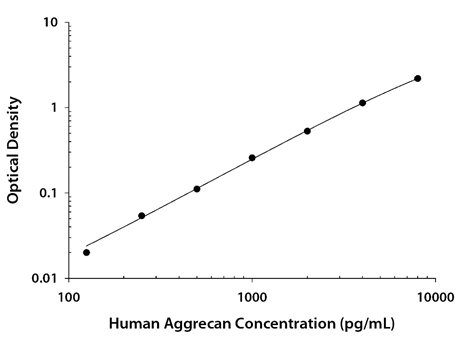Human Aggrecan Antibody Summary
Val20-Gly675
Accession # NP_037359
Applications
This product is intended for assay development on various assay platforms requiring antibody pairs. We recommend the Human Aggrecan DuoSet ELISA Kit (Catalog # DY1220) for convenient development of a sandwich ELISA.
Please Note: Optimal dilutions should be determined by each laboratory for each application. General Protocols are available in the Technical Information section on our website.
Scientific Data
 View Larger
View Larger
Human Aggrecan ELISA Standard Curve. Recombinant Human Aggrecan protein was serially diluted 2-fold and captured by Mouse Anti-Human Aggrecan Monoclonal Antibody (MAB11304) coated on a Clear Polystyrene Microplate (Catalog # DY990). Mouse Anti-Human Aggrecan Monoclonal Antibody (Catalog # MAB113041) was biotinylated and incubated with the protein captured on the plate. Detection of the standard curve was achieved by incubating Streptavidin-HRP (Catalog # DY998) followed by Substrate Solution (Catalog # DY999) and stopping the enzymatic reaction with Stop Solution (Catalog # DY994).
Reconstitution Calculator
Preparation and Storage
- 12 months from date of receipt, -20 to -70 °C as supplied.
- 1 month, 2 to 8 °C under sterile conditions after reconstitution.
- 6 months, -20 to -70 °C under sterile conditions after reconstitution.
Background: Aggrecan
Aggrecan, also known as aggrecan 1, chondroitin sulfate proteoglycan, and large aggregating proteoglycan, is encoded by the AGC1 gene with gene aliases of SEDK; CSPG1; MSK16; CSPGCP (1). As the key component of the cartilage extracellular matrix, aggrecan hydrates the collagen network and provides cartilage with its properties of compressibility and elasticity. Maintenance of aggrecan content is therefore critical to the function of the tissue and aggrecan degradation is an important factor in the erosion of articular cartilage in arthritic diseases (2). The deduced amino acid sequence of human aggrecan core protein consists of 2415 residues and predicts a signal peptide and domains of G1, IGD, G2, KS, CS-1, CS-2 and G3 (3). Two globular domains, G1 and G2, comprise the N-terminus of the proteoglycan and also contain link domains. The third globular domain, G3, corresponds to the C-terminus. The keratan sulfate (KS) and the chondroitin sulfate (CS) attachment domains are between G2 and G3. With KS and CS attached to the 250 kDa core protein, aggrecan monomers exist as a 1,000 to 2,000 kDa molecule. In addition, aggrecan monomers interact with hyaluronan through their G1 domain, resulting in larger aggregates containing 10 to 100 aggrecan monomers on a hyaluronan backbone (2). Aggrecan can be cleaved by MMPs and ADAMTSs at the Asn360-Phe361 and Glu392-Ala393 bond in the IGD (residues are numbered based on Accession # NP_037359), respectively (2). Inhibition of ADATMS4 and ADAMTS5 cleavage prevents aggrecan degradation in osteoarthritic cartilage, while mice with aggrecan resistant to MMP cleavage do not accumulate aggrean and develop normally (2, 4).
- Doege. K.J. et al. (1991) J. Biol. Chem. 266:894.
- Malfait, A.-M. et al. (2002) J. Biol. Chem. 277:22201.
- Caterson, B. et al. (2000) Matrix Biol. 19:333.
- Little, C.B. et al. (2005) Mol. Cel. Biol. 25:3388.
Product Datasheets
FAQs
No product specific FAQs exist for this product, however you may
View all Antibody FAQsReviews for Human Aggrecan Antibody
There are currently no reviews for this product. Be the first to review Human Aggrecan Antibody and earn rewards!
Have you used Human Aggrecan Antibody?
Submit a review and receive an Amazon gift card.
$25/€18/£15/$25CAN/¥75 Yuan/¥2500 Yen for a review with an image
$10/€7/£6/$10 CAD/¥70 Yuan/¥1110 Yen for a review without an image



